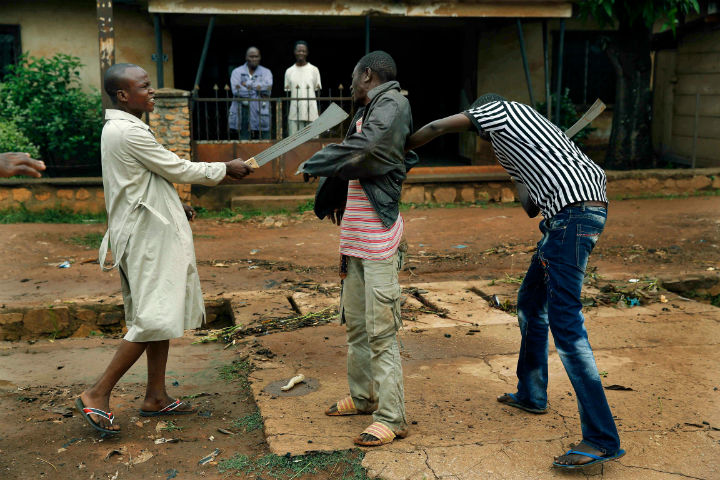United Nations Secretary-General Ban Ki-moon has called on Christian and Muslim leaders in Central African Republic (CAR) to “end the bloodshed” caused by ongoing sectarian violence.

“Too many people are scared and the country is on the brink of ruin. I appeal to everyone to follow the path of peace. The bloodshed must stop,” Ban said in a video address on Friday.
Several more people were killed as violent clashes between Christian militias and Muslim rebels in continued on Friday.
The UN High Commission for Human Rights said 27 Muslims were killed in the western village of Bohong, while about a dozen machete-armed Muslim men battled with a Christian militia in capital city Bangui.
Friday’s killings bring the death toll from sectarian violence in the last week to more than 600.
READ MORE: CAR crisis may not be next Rwanda, but still needs response: Dallaire
The United Nations High Commission of Refugees (UNHCR) said the rise in violence, which coincided with the arrival of French troops in the country last Friday, has forced an additional 159,000 people to flee their homes in the capital.
As many as 38,000 people have taken refuge at Bangui airport and another 12,000 at Saint Joseph Mukassa church in the capital.
Human rights groups and non-government organizations (NGOs) have previously estimated that 10 per cent of the population has been internally displaced and approximately 68,000 people have fled to neighbouring countries.
The displaced people taking shelter at Bangui M’Poko International Airport are “currently without latrines or washing facilities and with no shelter from the rains or sun,” UNHCR spokesperson Adrian Edwards said Friday at a press briefing in Geneva. “Conditions there and elsewhere are deteriorating.”
“Amnesty International’s team on the ground has witnessed how tens of thousands of civilians are in vital need of the protection the promised African-led peacekeeping force will provide,” Amnesty International Africa Director Netsanet Belay said in a statement. “But with only a week to go until the force begins its mandate, there is a serious lack of clarity about its composition, timeline for deployment and priorities.”
The AU has promised to increase its 2,500-troop contingent to 6,000 soldiers, under the one-year MISCA mandate. AU forces are to take over for the UN’s Central African Multinational Force (FOMAC), made of soldiers from central African countries, on Dec. 19.
The first contingent of troops, from Burundi, flew to the country on Thursday with the help of United States military aircraft.
“Protecting civilians from the ongoing atrocities and ensuring humanitarian assistance gets to those in need are absolute priorities,” Belay said. “But it will only be possible if the peacekeeping forces on the ground in the Central African Republic are adequately resourced and the African and French forces have clear guidelines for collaboration.”
Canadian Senator Romeo Dallaire also raised concerns this week about AU’s capabilities to assist and the need for help from countries with the necessary means to help stabilize the country.
France increased its presence in the country to 1,600 soldiers, sending in 1,200 troops last week after the United Nations approved the joint France-African Union mission to stabilize the country and disarm the fighters on both sides of the ongoing conflict.
Dallaire said the response from France was “not insignificant.” But he said France is an ex-colonial power taking action in a country that it still has a “vested interested in.”
“It exposes that there are only a few countries that have the abilities to deploy forces to protect people,” Matthews said in an interview with Global News this week.
Aid agency Doctors Without Borders (MSF) also gave a stern critique of the UN’s humanitarian response to the crisis.
READ MORE: Central African Republic’s ‘forgotten human rights crisis’ worsening
MSF International President Dr. Joanne Liu expressed concern about the non-governmental agencies that have been working in CAR as the humanitarian crisis worsened, following the March 21 Selaka rebel coup d’état that overthrew the government of former president Francois Bozize.
“During the growing emergency of the last three months, and most recently in Bangui just a few days ago, there has been no evidence of an adequate humanitarian reaction to the needs generated by repeated outbreaks of violence,” she said in a letter to Valerie Amos, Under-Secretary-General for Humanitarian Affairs and Emergency Relief Coordinator.
“The only actions undertaken by UN aid officials have been the collection of data related to the fighting and a few assessments confirming the need for an immediate response,” Liu wrote. “Repeated evaluations in the face of glaring needs, and numerous coordination meetings, have not led to any concrete action around the main hotspots.”
UN programs are providing assistance in the country, but the volatile situation has made aid distribution difficult.
World Food Program workers attempted to distribute food aid on Friday, but the situation was so chaotic the names of registered recipients could not be heard over the shouting crowd, The Associated Press reported.
A UNICEF cargo plane also arrived in Bangui on Friday, carrying 77 tonnes of supplies, including blankets and plastic sheeting to help approximately 38,000 people.
*With files from The Associated Press







Comments